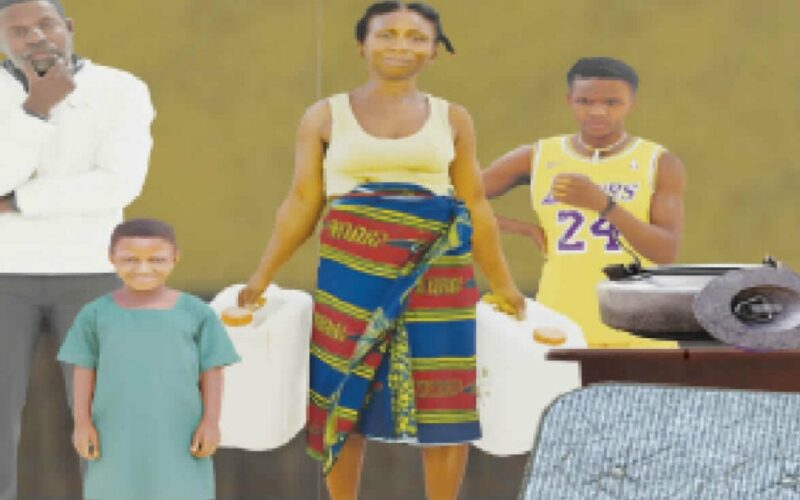Across Nigeria, countless hardworking citizens are being crushed under the weight of soaring inflation, failed investments, and mounting debt, as hope steadily fades away. Despite successive economic reforms, millions continue to struggle, trapped in a cycle of hardship and uncertainty, writes VICTOR AYENI
When 31-year-old Jude Okafor left his hometown in Orlu, Imo State, for Lagos in 2016, he found work as a room manager at a hotel in Ikeja, a position he held for four years.
Weary of the long daily commute from his new residence in Abule Egba to Ikeja, he resigned and took a factory job closer to home. Though he dreamed of saving enough to further his education, his modest earnings barely covered his living expenses.
Okafor’s fortunes seemed to shift in late 2022 when a friend introduced him to a small business transporting clothes from Katangua Market in Abule Egba to the South East.
But in December 2023, tragedy struck while he was returning to Lagos, turning his life upside down.
“Armed robbers attacked our bus,” he recounted to Saturday PUNCH. “They took all my money; everything I had made from my business, along with my phone and other valuables. I had borrowed millions to start the business, and losing it all was a big blow to me.”
The loss forced Okafor to remain in Imo State, too afraid to return to Lagos, where his creditors awaited him.
“Since then, I’ve been living from hand to mouth, with no means to repay my loan or restart my business,” he said. “I was doing well until that incident. Now I truly understand what people mean when they say, ‘May Nigeria not happen to you.’ That robbery attack was a huge setback, and I haven’t recovered.”
Okafor’s ordeal is far from unique in Nigeria, where countless citizens struggle with poverty, and business owners, farmers, and artisans face both human and systemic challenges that push them deeper into hardship.
The United Nations Sustainable Development Goal 1 (SDG 1) aims to end poverty. One of its targets is to ensure that “all men and women, in particular the poor and the vulnerable, have equal rights to economic resources, as well as access to basic services, ownership and control over land and other forms of property, inheritance, natural resources, appropriate new technology, and financial services” by 2030.
Yet, given Nigeria’s current economic realities, it remains uncertain whether the country will meet these targets within the next five years.
According to the most recent official household survey data from Nigeria’s National Bureau of Statistics, 30.9 per cent of Nigerians lived below the international extreme poverty line of $2.15 per person per day in 2018/19, before the COVID-19 pandemic.
2016: A sad turning point
For many Nigerians, 2016 was a year of financial struggle due to the economic recession that descended on the country like a blanket.
According to an estimate by the World Bank, during the country’s economic recession, the poverty rate rose to 89 million people, representing 43 per cent of the population.
Muyiwa Ajao, who was a farmer at that time, was one of the citizens whose business was affected by the economic decline.
During the previous year, the father of two had relocated from Lagos to Ibadan, the Oyo State capital, to start a poultry business, and he was making good money from it.
But by the end of 2016, due to an interplay of economic factors and unforeseen financial expenses, everything the turkey breeder worked for was gone.
“I was unable to pay farm staff,” Ajao recounted. “I was the only one left on the farm, and it was at that same time that my borehole got spoilt. I had to use my head to fetch water from a nearby farm for my turkeys.
“Because I couldn’t afford to take a bike, every day I would trek to my farm. This was a journey which lasted an hour to the destination and an hour back home. I was alone in the bush during the days.
“After a period of months, the bushes around my poultry pen house turned into a jungle. It was while searching for solutions to get rid of the bushes that a business idea came into my head, and I decided to grab the opportunity.”
The turnaround came for Ajao when he decided to diversify into selling agricultural tools from the money he made through turkey farming.
“Between then and now, my family has migrated abroad with two of our children,” Ajao added.
Taking to X to narrate his experience, a tax consultant, Kayode Okunola, described 2016 as a time in his life that he would not wish on his worst enemy.
“I made some unfortunate investment decisions, and the stock market hit me hard. I was left with heavy debts and big money that demanded urgent servicing. It broke me emotionally, mentally, and financially.
“I’ve always had a deep fear of poverty. I thought I had overcome it, but seeing it return with a vengeance nearly crushed me. Depression crept in.
“It got so bad that during the solemn church service for my 40th birthday, I didn’t have a single naira to give as an offering. But by the grace of God, I survived and came back stronger,” he wrote.
Okunola said the emotional wounds he had long tried to heal were reopened when the son of a politician sent him a private message on social media mocking his financial status.
“It triggered memories of humiliation, of self-doubt, of silently wondering if life was even worth continuing. I may not be poor by any standard today, but 2016 gave me Post Traumatic Stress Disorder. Let’s be mindful of our words. You never know what someone has survived or is still fighting through,” he added.
‘I regret leaving the village’
Reminiscent of the popular saying that life hits hardest when least expected, 34-year-old Peterson Onuoha has endured a series of blows that have left scars he is still struggling to heal from.
Onuoha, once a farmer in a village in Ideato Local Government Area of Imo State, stumbled upon what seemed like a promising business opportunity online in late 2022.
With hope in his heart, he sold his farmland, invested the proceeds, and set out for Lagos, determined to earn the promised high returns through what was described to him as ‘marketing.’
“These people packaged it as an investment business where you put in money and get high returns, which I now know were unrealistic. It was only when I arrived here that I realised it was a sham business.
“These scammers instructed us to persuade other people to invest their money in their scheme. Once we invested, we were told we would have to pay additional fees to release our funds. We were lodged in a building, given snacks, and lectured on how we needed to invite more investors, whose money would supposedly determine our earnings.
“It was there I saw that I had entered a ‘one chance’, a form of robbery. Talking with other people there, I realised they had been lured from different states, and we were all stranded. While I was still figuring out what to do, a fight broke out between two victims,” Onuoha told Saturday PUNCH.
According to him, one of the victims, a man from the North, had convinced his cousin to invest in the fraudulent scheme and move to Lagos. In pursuit of the promised high returns, the cousin sold most of his property to raise money for the investment.
When the cousin arrived at the building where they were lodged, he realised he had been duped, sparking a heated argument.
During the scuffle, one of the men allegedly pushed the other off the two-storey building. Onuoha said he witnessed the victim fall and break his hand.
“The man was in pain and bleeding,” he recalled. “It was a gory sight that still haunts me. At that moment, I knew the police would soon arrive because of the commotion. That was when I packed all my bags and ran away.
“I ended up stranded on the streets for a week before a good Samaritan let me stay with him. After appealing for help on Facebook, I finally found a menial job at a church camp.”
But Onuoha is yet to recover from the trauma of losing his farmland in the village for the illusion of a city’s pot of gold.
“I still regret leaving the village. What have I gained so far? Nothing. The money I make here can’t cover my needs due to the high cost of living. I have been insulted and shunned by people I thought would help me. I still hope to pool some money together and return to the village by next year,” he added, in a sad tone.
W’Bank, FG differ
Recently, the World Bank expressed concern that, despite Nigeria’s recent economic stabilisation efforts, about 139 million citizens now live in poverty.
On Wednesday, during an event held in Abuja, the World Bank Country Director for Nigeria, Mathew Verghis, commended Nigeria’s bold reforms in the exchange rate and petroleum subsidy regimes, describing them as “foundational” steps that could reshape the country’s long-term economic trajectory.
“Over the last two years, Nigeria has commendably implemented bold reforms, notably around the exchange rate and the petrol subsidy. These are the foundations on which the country has the opportunity to build a programme that can transform its economic trajectory,” he stated.
Verghis further disclosed that Nigeria’s foreign exchange market is stabilising, its reserves are climbing, and inflation is gradually easing.
However, the World Bank chief noted that these macroeconomic improvements had yet to translate into improved living conditions for ordinary Nigerians.
“Despite these stabilisation gains, many households are still struggling with eroded purchasing power. Poverty, which began to rise in 2019 due to policy missteps and external shocks such as COVID-19, has continued to increase even after the reforms. In 2025, we estimate that 139 million Nigerians live in poverty,” Verghis added.
The new figure indicated a sharp increase from 129 million recorded in April 2025 and 87 million in 2023, reflecting the deepening hardship among households despite ongoing economic reforms.
In its response on Thursday, the Presidency disputed the latest economic report by the World Bank, which estimated that 139 million citizens were living in poverty, describing the figure as “unrealistic” and detached from the country’s economic realities.
President Bola Tinubu’s Special Adviser on Media and Public Communication, Sunday Dare, in a post on his official X handle on Wednesday, contended that the poverty figures must be “properly contextualised” within the limits of global poverty measurement models.
“While Nigeria values its partnership with the World Bank and appreciates its contributions to policy analysis, the figure quoted must be properly contextualised. It is unrealistic,” he said.
The Presidency explained that the 139 million figure was derived from the global poverty line of $2.15 per person per day, set in 2017 using Purchasing Power Parity, and should not be mistaken for an actual headcount of poor Nigerians.
It noted that when converted to nominal terms, the $2.15 benchmark equals about N100,000 per month at current exchange rates, which is well above Nigeria’s new minimum wage of N70,000.
“There must be caution against interpreting the World Bank’s numbers as a literal, real-time headcount. The estimate is derived from the global poverty line of $2.15 per person per day, a benchmark set in 2017 Purchasing Power Parity terms.
“If converted nominally, that figure equals about $64.5 per month, or nearly N100,000 at today’s exchange rate, well above Nigeria’s new minimum wage of N70,000. Clearly, the measure is an analytical construct, not a direct reflection of local income realities.
“Poverty assessment under PPP methodology uses historical consumption data (Nigeria’s last major survey was in 2018/19) and often overlooks the informal and subsistence economies that sustain millions of households. The government, therefore, regards the figure as a modelled global estimate, not an empirical representation of conditions in 2025. What truly matters is the trajectory, and Nigeria’s is now one of recovery and inclusive reform,” the statement added.
From trust to tears
For many Nigerians, poverty is more than a statistic. It is a daily struggle that has crept into their lives and businesses, reshaping dreams and livelihoods over the past decade.
When Lagos-based graduate Semiu Omobola secured a job in 2019, he considered himself fortunate and was determined to make the most of the opportunity.
Being naturally frugal, he managed to save over N2 million, hoping to invest it in a side business that would sustain him after his contract job ended.
“I was advised to start an e-hailing cab business, but it ended in premium tears,” he told Saturday PUNCH.
“I bought a Nigerian used vehicle, and rather than earning from it, it was draining my funds. The person who sold the vehicle to me was a close friend I trusted, and he assured me it was in good condition.
“That car was always breaking down, but I kept repairing it. Rather than being a source of joy, it became a source of sorrow. The stress it caused took a toll on me, and when I realised it was about to ruin my life, I had to sell it at a giveaway price. The price wasn’t even one-tenth of what I had paid for it.
“It was a terrible experience. I became poor and developed high blood pressure at a young age. Later, I discovered that the man who sold the car had connived with my mechanic to sell me a problematic vehicle. Even though it happened years ago, I still find it hard to forgive them,” Omobola recounted.
Like Omobola, Ogun State-based entrepreneur Godson Ebiware described the sequence of challenges facing his shoe business as “life-draining.”
“I am not happy with how things are,” Ebiware noted. “A couple of years ago, I took a loan of N4 million to boost my shoe-making business. I was doing fairly well and repaying my loans, but things started spiralling out of control. Inflation affected the cost of materials, and it’s been hard to keep up.
“I have faced personal and financial challenges back-to-back, which have affected my business. Right now, I am in serious debt. I can’t even concentrate most of the time. I’m just trying to cope with the little I can gather.”
A business data analyst, Ugo Chikezie, lamented that since 2023, the country has recorded low points across all economic indices.
“Our economists and managers continue with round-tripping borrowed foreign debts, sanctioned in foreign countries, yet they claim they don’t care about the naira-to-dollar exchange rate because they want to run the agbado and cassava economy.
“Having interacted with many people who were born pre-Independence and seeing the excitement they felt on October 1, 1960, evaporate in their eyes makes me realise that the country has been badly managed from time immemorial. From the First Republic down to this 25-year journey into the so-called land of democracy, the country has continued to sink further into the abyss of poverty,” Chikezie said.
Losses that bred resilience
However, despite the bleak circumstances that have swallowed some businesses, some citizens, through resilience, have managed to overcome financial challenges.
Recounting her experience, Facebook user Confidence Samuel stated that she failed consistently in over five businesses before starting her current brand.
“I have been a hustler since childhood,” she wrote. “I loved having my own money and hated not having personal funds. I sold fried groundnuts while in secondary school during the holidays.
“I remember a holiday when I sneakily sold cooked groundnuts and made my own cash. I wasn’t even 15, and my dad scolded me. One time, I sold cold water because chilled water was scarce in the village where I went for the holiday, and we had the luxury of electricity then. I was just looking for opportunities to make legitimate money by all good means.
“A few years before I graduated from secondary school, I started reselling ready-made chin chin from vendors at Ngwa Road. While staying in Ogun State during a short-term academic session, I started another groundnut business in the hostel, and it thrived. I’ve done other businesses like perfume and data reselling, to name a few. Most of the businesses I started failed due to inadequate financial structures and lack of consistency.”
Samuel noted that her current business, which she has maintained for two years, has been tested in the crucible of consistency, building structures, and breaking free from past limitations.
“People should never give up until they build something that will stand the test of time. Imagine if I had concluded that business wasn’t for me because I failed consecutively in over five ventures?” she asked.
‘Nigeria needs to diversify’
Speaking with Saturday PUNCH, economist Olusegun Aderounmu urged the Nigerian government to strengthen economic diversification through “the promotion of non-oil sectors like agriculture, solid minerals, manufacturing, technology, and the creative industries.”
According to him, there is a need to incentivise local production through tax breaks and ensure easier access to credit for Small and Medium Scale Enterprises to enable them to thrive.
“Most importantly, they need to build value chains that connect farmers, producers, and markets to increase income and employment.
“To tackle poverty in Nigeria, there must be mass employment through industrial and infrastructure policy. They should establish industrial parks and special economic zones focused on youth employment and encourage local content policies that ensure firms and workers benefit from public contracts,” he added.







